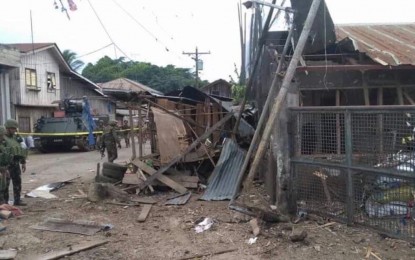By Manuel Mogato, Editor-at-Large

The site of a blast in Indanan, Sulu on June 28. The military now says the attack was the handiwork of a Filipino suicide bomber. (Photo from PNA)
(ANALYSIS)
Growing up in the early 1970s, at the height of Muslim secessionist rebellion in the southern Philippines, I heard stories about “juramentados,” Moro rebels armed only with machetes, charging toward soldiers and sacrificing their lives in suicide attacks.
My memory of juramentados was refreshed by Defense Secretary Delfin Lorenzana, who graced the photo exhibit of the Foreign Correspondents Association of the Philippines (FOCAP) last week at Greenbelt 5 mall in Makati.
Lorenzana spoke about the juramentados when asked about the possibility of a Filipino Muslim as a suicide bomber in the Jolo island blast that killed eight people, including three soldiers. Lorenzana said It was possible because Filipino Muslims were among the first warriors to carry out “suicide attacks” against invading forces.
The term “juramentado” dates back to the long Spanish period, when colonial troops struggled against determined and dedicated Muslim warriors who were prepared to die in daring attacks in the battlefield, a situation the Americans found themselves in at the turn of the 20th century.
The United States developed the Colt 45 pistol to stop juramentados from charging even after they were shot by a .38-caliber revolver.
Even the Japanese Imperial Army, which occupied the Philippines from 1942 to 1945, witnessed the bravery of Muslim juramentados, which could be compared to Kamikaze pilots towards the end of the Second World War.
On Wednesday, the Philippine National Police and the Armed Forces of the Philippines announced in a joint news conference that one of two men who detonated improvised explosive devices and killed themselves at an army outpost in Indanan, Sulu last June 28, was a Filipino. The conclusion was based on DNA tests on the suicide bomber that matched with a woman claiming to be his mother.
The announcement of the first Filipino suicide bomber in the south raises a new dimension in the country’s counter-terrorism strategy. There had been two other suicide bombing attacks in the south in past 12 months – one in Basilan and another in the Roman Catholic cathedral in Jolo early this year.
But the military blamed foreign jihadists for the two earlier suicide bomb attacks – a German-Moroccan and an Indonesian couple.
Bombings are not unusual in the Philippines since the al Qaeda-linked Abu Sayyaf Group (ASG) emerged in the southern Philippines in 1990. The Moro Islamic Liberation Front (MILF), which signed a peace deal with the government in 2014 and was given authority to govern a new Bangsamoro Autonomous Region in Muslim Mindanao (BARMM) this year, was also blamed for bomb attacks in Metro Manila and central Mindanao in the early 2000s.
Bombmakers from Indonesia and Malaysia, including those involved in the deadly attacks in the tourist area in Bali, Indonesia, also found sanctuary in the troubled southern islands of Mindanao, Basilan and Jolo.
There were numerous bomb attacks in Southeast Asia, including Mindanao, but there had been no significant suicide attacks until last year when the United States and its allies won decisive battles in Syria and Iraq. The defeat of Islamic State militants in Iraq and Syria has made Southeast Asia the next battleground for extremists.
Indonesia, Malaysia, the Philippines and Singapore are fertile grounds for Islamist militancy, but the more stable Southeast Asian nations have effective intelligence and law enforcement agencies to counter terrorism. That leaves the Philippines as the most vulnerable as shown by the 2017 Marawi conflict.
Mindanao has become an attractive destination for foreign jihadists displaced in the Middle East, as well as Southeast Asian militants returning to the region and looking for a new area to set up their caliphate, as the rehabilitation and rebuilding of Marawi face delays and the new BARMM government struggles with limited and delayed release of funds needed for key reforms and ambitious infrastructure projects to improve living conditions in some of the country’s poorest provinces.
The suicide bombing in Indanan is a wake-up call for the Philippines to roll back Islamist radicalism in communities, schools, and even in prison cells in Bicutan and Muntinlupa. The government must speed up Marawi’s rebuilding because many residents are getting impatient and may soon sympathize with the small remnants of the Maute group that occupied Marawi for five months, and other extremist groups like the Bangsamoro Islamic Freedom Fighters, Abu Sayyaf Group and Ansar Khalifa Philippines.
The Indanan suicide attack could be the start of a more dangerous Islamist radicalism, which could lead to a repeat of the Marawi siege.
Manuel “Manny” Mogato has been a journalist for 35 years. A former Reuters correspondent, Mogato covered politics, disasters, insurgencies and diplomacy. He won the Pulitzer Prize for international reporting in 2018.